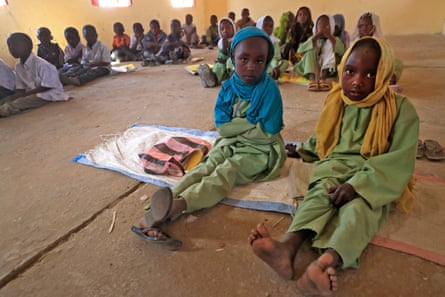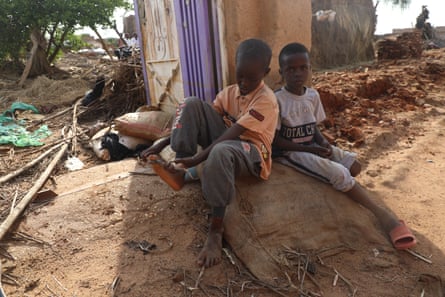Sudan faces ‘generational catastrophe’ as millions of children miss school
Floods, militia raids and hunger mean a third of children are not in school at all, while the rest have too few teachers, aid groups warn.
Nearly every school-age child in Sudan is missing out on education, either completely or facing serious disruption, aid organisations have warned.
Schools in some states reopened this week after delays due to severe flooding but millions of children are still unable to go, leaving the country facing a “generational catastrophe”.
Poverty, a lack of qualified teachers and strikes by teaching staff, the legacy of the Covid-19 pandemic and low vaccination rates are among the many factors that have contributed to the crisis.
Flooding and attacks by militias destroyed more than 600 schools during August and September, according to the education ministry. Schools are often just shells of buildings, lacking furniture, running water or toilets.
Nearly 7 million of Sudan’s children aged between six and 18 – or a third of school-age children – are not in school at all, according to a joint statement by Unicef and Save the Children.
The worst-affected state is central Darfur, where 63% of children do not go to school; in West Darfur the figure is 58%; and in eastern Kassala state it is 56%.
The education of a further 12 million children “will [be] heavily interrupted by a lack of sufficient teachers, infrastructure and an enabling learning environment to make them reach their full potential”, said the statement.
Most of those who are in classrooms have fallen behind in their learning; 70% of 10-year-olds at public schools cannot read a simple sentence, according to Unicef.

“It’s a generational catastrophe,” said Owen Watkins, communications chief at Unicef Sudan. “Children are always the future of a country. Investing in them is the right thing to do – and they will contribute hugely to the future GDP of the country.
“Children in school is not just about maths, reading and writing,” he added. “They also learn social skills … in a protected environment.”
Ahmed el-Safi, a teacher and former head of a school in Um-Oshar, in Khartoum’s southern outskirts, said that on his street of 20 houses, three to four children in each household were not attending school.
“They simply cannot go to school while they are hungry. Many of them have to go to the market to sell plastic bags or anything just to feed themselves,” he said.
“Despite being a teacher and a head of a school at one point in my life, I found out that my son used to miss classes to go and sell tickets at a cinema in Omdurman. When I asked him, he told me that he could not go to school while some essentials are missing in his life. You know they pay us very little, and as teachers we could not feed our children properly.
“I could not send my three children to university. They finished high school and helped their little brother to go to university, who studied media, but he never got a job. In the end he became a builder, which doesn’t require any media skills.
“Even the ones who go to schools cannot learn anything, as classes are overcrowded with sometimes up to 140 pupils. How can a teacher do his or her job in that environment?”

“All the classrooms collapsed in the floods, even our houses collapsed; we are now in tents,” said Mahmoud Ishag, 55, a teacher and a father of 16, who lost his 10-year-old son in the disaster.
“Whole villages changed professions. Schoolchildren turned into sellers in the markets and so did the teachers. I now sell onions in the market instead of teaching; some of my children help me but the majority are girls so they cannot work.”
… we have a small favour to ask. Millions are turning to the Guardian for open, independent, quality news every day, and readers in 180 countries around the world now support us financially.
We believe everyone deserves access to information that’s grounded in science and truth, and analysis rooted in authority and integrity. That’s why we made a different choice: to keep our reporting open for all readers, regardless of where they live or what they can afford to pay. This means more people can be better informed, united, and inspired to take meaningful action.
In these perilous times, a truth-seeking global news organisation like the Guardian is essential. We have no shareholders or billionaire owner, meaning our journalism is free from commercial and political influence – this makes us different. When it’s never been more important, our independence allows us to fearlessly investigate, challenge and expose those in power.



